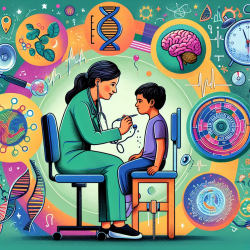Introduction
In the ever-evolving field of speech-language pathology, staying informed about the latest genetic research is crucial for practitioners aiming to provide the best outcomes for children. The recent study titled A novel HECW2 variant in an infant with congenital long QT syndrome offers significant insights that can enhance our understanding of neurodevelopmental disorders and their implications in clinical practice.
Understanding the HECW2 Variant
The study investigates a novel variant in the HECW2 gene, which has been linked to neurodevelopmental disorders characterized by hypotonia, seizures, and absent language (NDHSAL). This variant was identified in an infant with congenital long QT syndrome (LQTS), a genetic disorder affecting cardiac rhythm. This research highlights the potential for HECW2 variants to cause both cardiac and neurodevelopmental issues, expanding our understanding of the gene's impact.
Implications for Speech-Language Pathologists
For speech-language pathologists, this research underscores the importance of considering genetic factors when assessing and treating children with neurodevelopmental disorders. Here are some practical steps practitioners can take:
- Collaborate with Geneticists: Work closely with geneticists to understand the genetic underpinnings of your patients' conditions. This collaboration can provide a more comprehensive understanding of the child's needs.
- Incorporate Genetic Information: Use genetic information to tailor therapy plans. Understanding the genetic basis of a disorder can guide interventions and set realistic goals for therapy.
- Stay Informed: Keep abreast of the latest genetic research. As new variants are discovered, they may offer insights into more effective treatment strategies.
Encouraging Further Research
While the study provides valuable insights, it also opens the door for further research. Speech-language pathologists can contribute to this growing body of knowledge by:
- Documenting Case Studies: Share detailed case studies of patients with similar genetic profiles. This data can be invaluable for researchers and other clinicians.
- Participating in Research: Engage in collaborative research projects that explore the intersection of genetics and speech-language pathology.
- Advocating for Genetic Testing: Encourage families to consider genetic testing, which can provide critical information for diagnosis and treatment planning.
Conclusion
The study of the HECW2 variant in relation to congenital long QT syndrome and neurodevelopmental disorders highlights the intricate relationship between genetics and clinical outcomes. By integrating these insights into practice, speech-language pathologists can enhance their therapeutic strategies, ultimately leading to better outcomes for children.
To read the original research paper, please follow this link: A novel HECW2 variant in an infant with congenital long QT syndrome.










